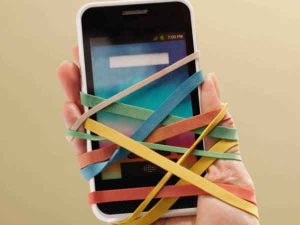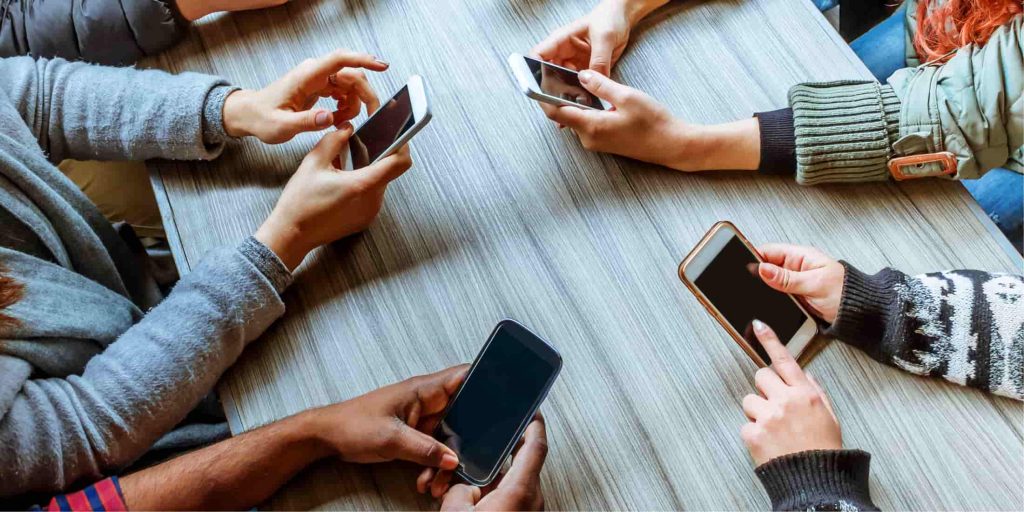Contents
What Is Mobile Addiction?

Mobile addiction is a condition that is characterized by a strong, unhealthy, and persistent need to use a mobile device, despite negative consequences. Mobile addiction is defined as a strong, unhealthy, and persistent need to use a mobile device despite negative consequences.
It can be broken down into three stages: pre-contemplation, contemplation, and maintenance.
During the pre-contemplation stage, people are not aware that they have a problem with their mobile usage and will start to notice this during the contemplation stage, where they try to cut back on their usage but find themselves unable to.
In the maintenance stage, people may feel as though they have an addiction as they continue using their mobile device without any concern for the negative impacts it may be having on themselves or those around them.
Signs of Mobile Addiction
There are a number of warning signs that can indicate that someone may have a problematic relationship with their mobile device. Some of these signs include-
- Feeling the need to use your phone constantly
- Feeling anxious or irritable when you’re not able to use your phone
- Using your phone in situations where it is not appropriate
- Neglecting responsibilities in favor of using your phone
Why Does Mobile Addiction Occur?
There are a number of reasons why someone may develop an addiction to their mobile device. For some people, it may be because they are looking for a way to fill a void in their life. Others may be using their phone as a form of self-medication to deal with stress or anxiety. And for still others, they may be using their phone as a way to cope with loneliness or depression.

There are different ways that people suffering from an addiction to their mobile device can start dealing with it. One of the first steps is for them to try and cut back on the amount of time they spend on their phone or limit the number of times they check it every day. It may take some time to build up this self-control but eventually, by practicing setting boundaries, people will be able to return to healthier habits.
Future of Mobile Addiction
Though mobile addiction is a relatively new development in our society. There are still concerns about its effects on society. Some people feel as though this is not an addiction but rather a way to fill free time. While others feel that this is more than just an annoyance and is actually more like substance abuse. There are some professionals who believe that the best way of treating this problem would be to develop new ways of communicating with your friends and family members. So that you can still have a healthy relationship with them even if you are unable to use your mobile device.
What Should I do?
There are different things you can do depending on where you are in the addiction cycle. If you’re not yet aware of the problem. Then it is important for you to start taking steps to cut back on your usage. Then, once you notice the negative impacts this has on your day-to-day life. It may be time to seek help for overcoming this addiction. The best way to know what is right for you is by speaking with a medical professional. Who can determine if mobile addiction is something that you have or are at risk of developing? There are a number of reasons why people develop an addiction to their mobile devices. Some reasons include filling a void in your life, self-medicating stress and anxiety, and using it as a way to cope with loneliness or depression.

- There are different professionals that have their own views on how to best treat this addiction: some believe that developing new ways of communicating with friends and family members is a healthy way to overcome the addiction while others feel as though this could be more like substance abuse. There are no known treatments at the moment.
- For not yet being aware of the problem, you should try to cut back on your usage. Once you notice negative impacts on your day-to-day life, it is time for professional help.
- There are different ways that someone can deal with their addiction: limiting the amount of time they spend on their phone, cutting back on how many times they check it a day, and practicing setting boundaries.
- There are many different things you can do to help with your addiction, such as limiting the amount of time you spend on your phone, cutting back on how many times a day you check it, and practicing setting boundaries.
- If you’re not yet aware that you have an issue with using your mobile device, try to cut back on your usage. Once you notice negative impacts on your day-to-day life, it may be time to seek help for overcoming this addiction.
Why Does The Problem Occur?
There are many different reasons why people develop an addiction to their mobile devices. Some reasons include filling a void in your life, self-medicating stress and anxiety, and using it as a way to cope with loneliness or depression.
Another reason why people may develop an addiction to their mobile devices is that they are looking for a way to connect with others. We live in a society where we are constantly connected to the internet, and many people find that they are unable to disconnect from their devices even when they are not using them. This can lead to feelings of loneliness or isolation, which can then lead to an addiction to mobile devices.
Mobile devices may be used as a way to deal with these feelings of loneliness and isolation.
When we receive texts, we feel like we are getting a piece of someone’s attention, which can make us feel wanted and needed at the moment. There is also the aspect of instant gratification when receiving texts. We will get immediate responses, which can be more gratifying than waiting for someone to reply via email or phone call.
There are also nonternative benefits of being addicted to your mobile device, such as having easier access to information or being able to book an appointment with a therapist without ever speaking with them over the phone. This is beneficial in the sense that it eliminates the need to wait for an appointment.
Prevention For Mobile Addiction
 The best way to avoid developing an addiction to your mobile device is by limiting your usage. It is important to set boundaries with yourself and your friends. In order to make sure that you are feeling like you are getting enough time away from all of the technology.
The best way to avoid developing an addiction to your mobile device is by limiting your usage. It is important to set boundaries with yourself and your friends. In order to make sure that you are feeling like you are getting enough time away from all of the technology.
It may be helpful to try using your mobile device in moderation. Such as having certain times of the day when you are allowed to use it. For example, you could set a rule that says “I will not check my phone during dinner. That way, you can still spend quality time with your family or friends without checking your phone every five seconds.
Another way to avoid developing an addiction is by practicing mindfulness. Take the time to really appreciate moments without your phone in your hand. This can be a great opportunity for self-reflection and communicating with others around you.
Treatment
There are many different treatments that can be used in order to help people overcome their addictions to mobile devices. It is important to get professional help in order to get the best results.
There are many different therapy options that can be used, such as cognitive-behavioral therapy (CBT) and dialectical behavior therapy (DBT). CBT helps you identify negative patterns so that they can be changed over time. While DBT teaches you how to accept negative emotions and learn how to better cope with them.
Other treatment options can include using a mobile device addiction app, group therapy, or going on a detox program. Where you take an extended break from technology in order to help you relax and refocus. This may involve taking certain steps to change your phone habits, such as deleting certain social media apps. So that you are not constantly checking your notifications.
How to Deal with It?

If you are struggling with a mobile device addiction, there are many things that you can do in order to try and overcome it.
- One of the best things that you can do is set boundaries for yourself. This means limiting your usage and making sure that you are not using your phone all the time. You can also try using your phone in moderation, such as having certain times of the day when you are allowed to use it.
- Another way to deal with an addiction to mobile devices is by practicing mindfulness. This means taking the time to appreciate moments without your phone in your hand and really focusing on what is happening around you.
- If you are feeling like you need help in order to overcome your addiction. There are many different treatment options that can be used. You can try using a mobile device addiction app, group therapy. Or going on a detox program where you take an extended break from technology. In order to help you relax and refocus.
- If you think that you would benefit from professional help in dealing with your addiction to mobile devices. It may be beneficial to seek out a therapist or other mental health professional. You can search for one in your area by asking family members or friends for recommendations, looking online. Or call the local mental health association.
Another way to start treatment is by visiting an outpatient clinic if you are dealing with mobile addiction through therapy. If you are struggling with more serious issues, such as suicidal thoughts. You may have to go to the emergency room or an inpatient rehab facility.
Conclusion
The human brain is wired to crave novelty and stimulation. So it’s no wonder that many of us are drawn to our mobile devices. The problem is not the technology itself. But the fact that we’re using it at all hours of the day for non-stop entertainment or information consumption. All this screen time causes us to feel anxious when away from screens. It can lead to more excessive usage as a result. We recommend setting aside some “screen-free” time every day. If you want your relationship with your phone (or TV) back on better terms.
A Word From Therapy Mantra
Your mental health — Your psychological, emotional, and social well-being — has an impact on every aspect of your life. Positive mental health essentially allows you to effectively deal with life’s everyday challenges.
At TherapyMantra, we have a team of therapists who provide affordable online therapy to assist you with issues such as depression, anxiety, stress, workplace Issues, addiction, relationship, OCD, LGBTQ, and PTSD. You can book a free therapy or download our free Android or iOS app.


